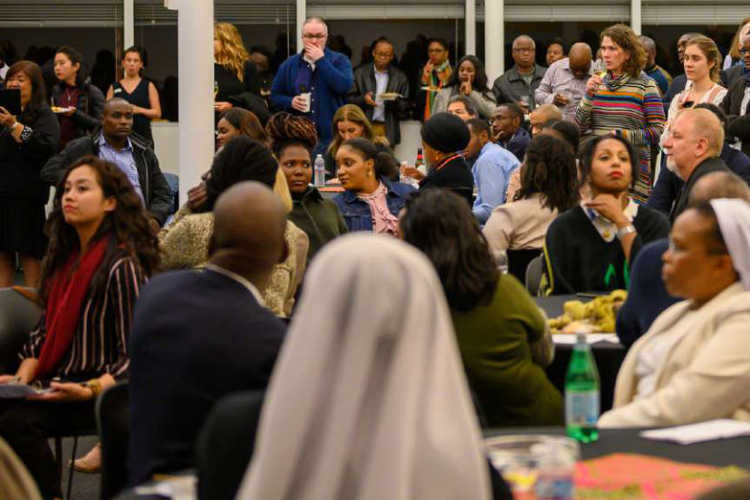
• Adkins: Africa a priority for Biden administration
• Gates Foundation reiterates $7 billion for Africa as Ukraine war diverts donor cash
• USAID unveils new policy framework
The eighth edition of the African Diaspora Investment Symposium (ADIS) opened yesterday in Silicon Valley, California, United States, with discussions bordering on engaging the networks of African Diaspora in pushing development on the continent beyond remittances.
In her opening remarks, founder and Executive Director of African Diaspora Network (ADN), Almaz Negash, noted that the builders of Africa’s future are in grassroots entrepreneurs on the continent and connecting them to legacy funders and Diaspora Investment will go a long way in supporting growth on the continent and achieving the Africa Union 2050 goals.
Despite being home to vast potential and the recent rise of small businesses with ideas for change, Africa still faces many daunting challenges.
This notwithstanding, Travis Adkins, CEO of the US African Development Foundation (USADF), has said that cooperation with Africa is among the core strategic goals of the Biden administration, and the central focus of the USADF, noting that there is a strong recognition in the US of “the critical importance” of Africa.
Because of the US’ “historic ties” with Africa and the continent’s bright future, he added, consolidating relations with America’s African allies remains a top priority for the Biden administration.
“Being descended from the African continent, I have even that much more incentive to make sure that we’re reconnected strongly and in ways that are mutually beneficial to the US and to Africa,” Adkins said.
The USADF is the only US government foreign assistance agency focused solely on Africa, prioritizing direct investments in smaller enterprises in the continent.
“Small and medium enterprises even in the United States are the foundation of our economic success, and the same is true in Africa,” he said. “Because for us the focus is the everyday people of Africa. These everyday people can achieve success by embracing an “entrepreneurial spirit,” Adkins said, arguing that African economies can grow as ordinary people grow their businesses to tackle their respective countries’ extremely high unemployment numbers without having to wait for the government.
He however challenged the continent to work towards changing the dismal engagement of women in leadership. According to him, of the over 45 African leaders that attended the US African Leaders Summit in Washington DC last December, only one woman was represented among the African leaders despite women’s huge population on the continent.
AMID diversion of funds by development partners to the war in Ukraine, the Bill & Melinda Gates Foundation, yesterday, reiterated its commitment to investing $7 billion to Africa over the next four years, as announced by Bill Gates last year.
Speaking at ADIS, Senior Program Officer, Engagement at Bill & Melinda Gates Foundation, Motaz Attalla, said the Foundation’s pledge, which is up 40% on the amount spent during the previous four years, will target projects tackling hunger, disease, poverty and gender inequality. Nigeria, Africa’s most populous country, will take the biggest share.
He said: “The European budgets are deeply affected by the Ukraine war and so right now the trend for aid is not to go up.
“Our foundation will continue to support solutions in health, agriculture, and other critical areas—and the systems to get them out of the labs and to the people who need them.”
MEANWHILE, the U.S. Agency for International Development (USAID), yesterday, launched its new Policy Framework: Driving Progress Beyond Programs. The Policy Framework outlines major policy objectives while providing a guide for the Agency to recruit new partners and take on crucial reforms.
The Policy Framework establishes three overarching priorities to drive progress through and beyond its programs.
Announcing this yesterday, Administrator of USAID, Samantha Power, said the Framework comes at a decisive juncture.
“A set of global, compounding risks imperils development progress, undermines democracy, and threatens stability. At the same time, a competition is underway to shape the international order, testing the global community’s ability to work together to confront grave threats. In this moment, the United States, and our democratic partners, must offer inclusive leadership and bold action to extend the reach of human dignity – especially in communities too often excluded or left behind. And we must drive progress in ways that surpass the confines of the budgets we receive or the programs we administer.”
“The Policy Framework is USAID’s highest-level policy document. It lays out a collective vision for international development, translates U.S. national security and foreign policy goals into Agency priorities, and promotes coherence among our development, humanitarian, and crisis-response policies and how to implement them.”
Follow our socials Whatsapp, Facebook, Instagram, Twitter, and Google News.







